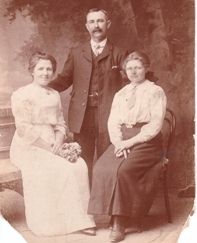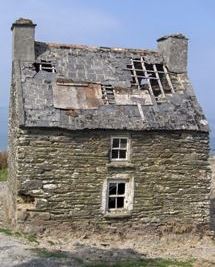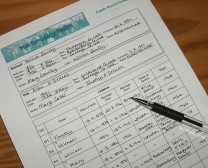- Home ›
- Irish family history for beginners
Researching your Irish roots: Where to start

Investigating your Irish roots often feels daunting when you first start out. It shouldn’t. Irish genealogy really isn’t as difficult as it might appear, nor as difficult as some people might have told you.
There are many, many more sources of information than you have probably been led to believe.
It is true that a lot of priceless records were lost in the 1922 fire at the Public Record Office in Dublin, but an awful lot of other sources were not stored there and have survived.
That doesn’t mean finding your ancestors is as easy as ABC; it just means most people can throw at least some light on their Irish roots when they start looking.
So where to start?
Start with yourself and work backwards
Write down as much information as you already have about your parents,
your grandparents and your grandparents' parents. Verify your sources as
you go. You'll immediately see the gaps in your knowledge. Use these free
blank genealogy forms to start recording your Irish roots.
Talk to your relatives
First of all, ask your oldest relatives for their memories of the family.
Then move on to younger ones who may have heard stories or might remember
some pertinent details about your Irish roots. Start with some clearly
focused questions but allow your relatives to reminisce: you might pick up some gems in the
process. Learn more about finding family history stories through your relatives'
memories: Interview preparation; Interview etiquette; Interview questions.

Find your ancestor's place of origin in Ireland
For many family historians this can be the biggest
hurdle to connecting with their Irish roots. If you already know the townland (the smallest Irish land division) where your
ancestors used to live, you're one of the lucky ones. If you know only that 'they came from Ireland' or that they came from a
specific county, your biggest task will be to pin down this
all-important location.
Deal only with facts
Family
legends can be a source of guidance but are rarely 100% accurate. The chartered accountant may turn out to have been a clerk in an
accounts office. The ancestral farm may have been a simple hovel with a potato patch
outside. Stirring tales of daring-do and selfless kindness have probably been
much embellished over the years so don't become too attached to them! While there is often a grain of truth to
these stories, they should not dictate the entire course of your research into
your Irish roots.
Develop your Irish roots research plan
Think about which lines to follow.
You have two parents, four grandparents, eight great-grandparents and
so on. You have to draw the line somewhere!
Decide which branch of your Irish roots you are going to study.
Its traditional to follow the male line from your father and the
female line from your mother (which is always more tricky than the
paternal route), but it's entirely up to you. Just choose one line for
now. You can return to start another line at a later date.

Record your data
You're going to accumulate huge amounts of information from a variety of sources;
you won't be able to retain it all in your head. Get in the habit of carefully
recording every piece of new data as you uncover it. There will be times in the
future you'll be so glad you did! Use these free
family history forms to get you started.
Get organised
If you scribble down notes on scraps of paper, you're going to lose valuable
data. You really need to approach your family history research in an orderly
fashion.
Be prepared
You are likely to find one or two skeletons in the cupboard once you start researching your family history.
Accept that the truth may be somewhat less attractive than its telling in family tales, and be honest in your recording.
Don't be too ambitious
For the majority of us with
Irish ancestors, searching for our Irish roots leads us to poor, landless
labourers. As such, their lives were not well documented and, where records do
survive, they are unlikely to date from much before 1810, at best. For many,
the first half of the 19th century will be as far back as you can go.
By the time you have completed this first stage of your research, you will have a much deeper sense of your Irish heritage and of the future direction of your family history research. You will also be ready to take the Next Steps towards discovering your Irish roots.
By the time you have completed this first stage of your research, you will have a much deeper sense of your Irish heritage and of the future direction of your family history research. You will also be ready to take the Next Steps towards discovering your Irish roots.
